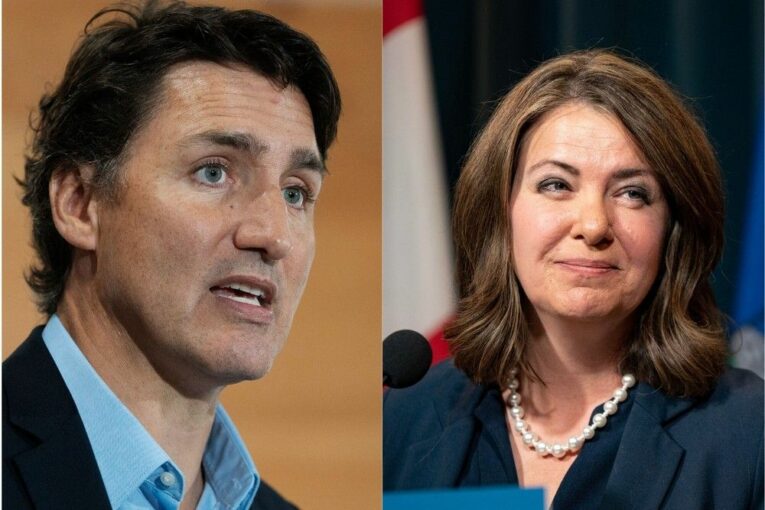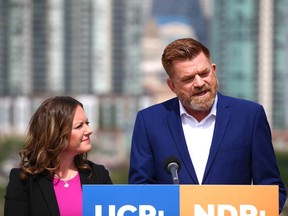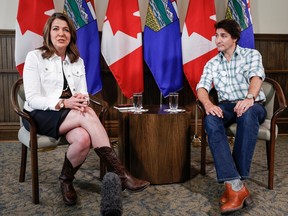
Fireworks have erupted regularly between Alberta and Ottawa this summer over energy and environmental policies, yet some progress is quietly being made in the background.
Slowly, things are moving.
The feuding sides have verbally agreed to the terms of reference for a new working group between the feds and the province. It’s designed to examine some of the thorniest climate and energy issues between the Trudeau and Smith governments.
“This is a great signal to the people of Canada, letting them know that the federal government is able to sit down and compromise and find a path forward with the provincial governments,” Alberta Energy Minister Brian Jean said Monday.
“I believe they are going to be constructive.”
Prime Minister Justin Trudeau and Premier Danielle Smith agreed to form the bilateral committee after they sat down in Calgary at Stampede last month.
The joint working group, which includes senior government officials from both sides, will meet regularly over the next eight to 12 months “to discuss joint policy priorities,” according to a draft copy of the terms of reference.
“The primary purpose of the working group is to share information, data and analysis to help develop and reach agreements . . . on how to achieve the governments’ shared emissions reductions objectives,” it states.
The document says it will provide “a mechanism by which Alberta and Canada reconcile areas of shared jurisdiction over matters related to emissions reduction and energy development, and respect each government’s areas of exclusive jurisdiction.”

The terms of reference detail potential areas of discussion and outcomes that could take place on key concerns.
These include how to remove policy barriers to speed up decarbonization of the power sector and oil and gas industry, and exploring options to use international carbon credit trading mechanisms — included under Article 6 of the Paris Agreement — that could see Alberta and Canada receive credits for exporting LNG and displacing higher-emitting fossil fuels in other countries.
It could also include developing approaches to streamline federal and provincial regulatory approvals for the use of small modular nuclear reactors in Alberta.
More divisive matters, such as Ottawa’s clean electricity regulations that require a net-zero power grid in the country by 2035, and the federal government’s plans to cap emissions on the oil and gas sector, will also come up.
Earlier this month, Ottawa released regulations for the policy to push for a net-zero power grid in the country by 2035. Alberta favours a 2050 timeline, maintaining Ottawa’s plan is unconstitutional and would impose steep costs on the province.
The terms of reference pointed out the bilateral group has targeted timelines for working toward an agreement or understanding to “inform and influence the Clean Electricity Regulations” within three months.
It also states the group will share information to understand Alberta’s concerns about Canada’s draft oil and gas emissions cap before they’re finalized, and identify ways to streamline federal and provincial decision-making on energy and emissions reduction developments.
Businesses and industry groups have been pushing in recent years for shorter timelines and greater clarity surrounding the regulatory processes for major projects.
However, reaching an agreement could prove difficult, given the hard lines both sides have taken over the emissions cap and the net-zero grid by 2035. The working group will not prevent either side from heading to the courts to sort out any questions about constitutional responsibilities over such areas.
“It is expected that during this period the governments may, individually or collectively, advance initiatives during the 12-month horizon,” the draft states.
“Participation in this working group is voluntary and does not prevent either government from asserting jurisdictional arguments in the future on matters discussed by the working group.”

A federal source said Ottawa has verbally approved the terms of reference and will formally sign on to them in the coming days.
“The Canada-Alberta working group terms of reference put into writing what has always been our government’s preferred path of open discussion,” federal Environment Minister Steven Guilbeault said in a statement.
“The government of Canada remains committed to climate and economic action as we pursue a net-zero electricity grid by 2035, and an oil and gas sector emissions cap. The working group discussions will carry on in parallel to these federal initiatives and will not affect the timelines for delivery.”
Jean, who is heading to Quebec this week for the annual meeting of Canadian energy and mining ministers, said he’s hoping to find common ground, but noted Alberta remains opposed to the federal policies on the 2035 net-zero grid and the oilpatch emissions limit.
“I do know in law there’s the opportunity for them to be stopped if they continue to intrude in provincial jurisdiction. We will stop them and we’ve made that very clear,” he added.
Marla Orenstein, director of the Natural Resources Centre at the Canada West Foundation, who will address the energy ministers’ meeting in Quebec this week about regulatory efficiency, said there are many environmental and energy policies that require co-operation between the two levels of government.
Recommended from Editorial
-

Braid: Smith takes a tough stance against Ottawa’s toothless electricity rules
-

Alberta minister says federal strings on electricity climate funding a ’threat’
-

Varcoe: Premier warns of blackouts under feds’ net-zero power plan, while billions of renewables hang in balance
-

A lot more wind and sun in Alberta’s forecast for a net-zero power future
On some matters, such as reducing methane emissions from the energy sector or exploring the development of small modular reactors, the federal and provincial governments have been able to make progress.
The more difficult areas involve questions about which level of government has jurisdiction over major issues such as the federal emissions cap on the oil and gas sector, she said.
“There’s so many things going on in the energy space right now that it’s pretty easy to lose sight of just how much is taking place . . . They have been very public fights but, at the same time, there have also been private successful collaborations,” Orenstein said.
“I’d like to see us in a situation where the political heat gets turned down.”
Chris Varcoe is a Calgary Herald columnist.
You can read more of the news on source
